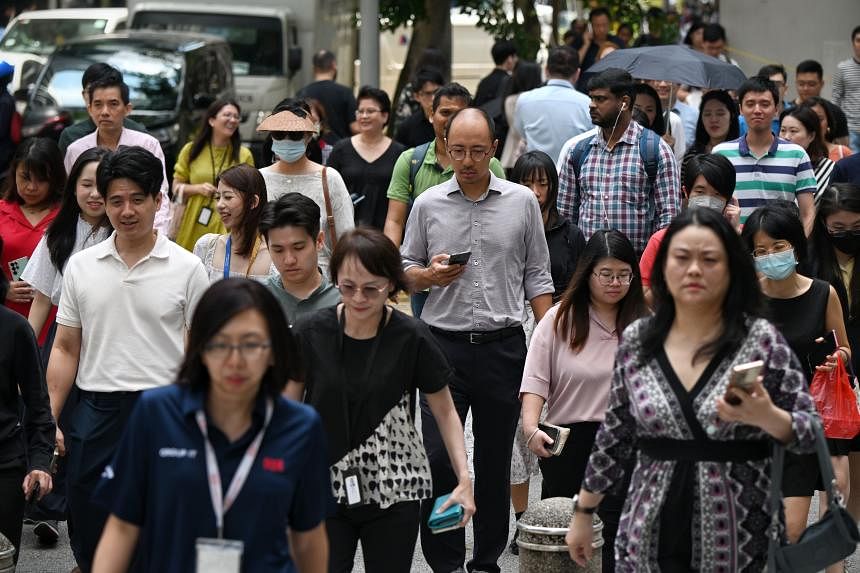SINGAPORE – Real median income in Singapore fell 4.5 per cent in the first half of 2023, compared with the same period in 2022, based on preliminary estimates.
This was due to elevated inflation and a weaker economic outlook, Senior Minister of State for Manpower Zaqy Mohamad told Parliament on Tuesday.
He added that the drop in real incomes was felt by workers across different job sectors, as inflation outpaced wage increases.
Nominal median income, which is not adjusted for inflation, still grew, by an estimated 0.9 per cent year on year over the first half of 2023, said Mr Zaqy.
He was responding to questions from Mr Edward Chia (Holland-Bukit Timah GRC) and Mr Saktiandi Supaat (Bishan-Toa Payoh GRC) on the impact of price increases on income growth for Singapore workers, especially those who are more financially vulnerable.
The income figures are for Singaporeans and permanent residents in full-time work. They had enjoyed wage gains over the last five years, with real median income growing by about 9.4 per cent from 2017 to 2022, or 1.8 per cent per year, said Mr Zaqy.
Workers at the 20th income percentile saw real incomes grow faster than those at the median, with an increase of 2.9 per cent per year from 2017 to 2022, he added.
Productivity also grew, at a rate of 2 per cent per year over the same period. This measures the rise in real value-added per worker.
On an annual basis, gross domestic product growth slowed to 0.5 per cent in the first half of 2023, from 2.1 per cent in the fourth quarter of 2022.
OCBC Bank chief economist Selena Ling said weaker economic growth generally means demand for some goods and services has fallen, and affected companies would feel the impact on their bottom lines.
If it is sustained, firms may take cost-cutting measures, which could impact pay increments and bonuses, for instance.
Comparable half-year figures are not available, but median income last fell on an annual basis in 2020 owing to the Covid-19 pandemic. In that case, nominal median income declined by 0.6 per cent, compared with 2019, while real median income declined by 0.4 per cent, according to Ministry of Manpower data.
Looking ahead, Mr Zaqy noted that inflation is expected to moderate over the rest of 2023. “That means, hopefully, the situation with the declines in real incomes potentially moderates,” he said.
In 2024, however, nominal wage growth for resident workers is expected to ease overall as labour demand cools, said Mr Zaqy.
But it could remain elevated in several sectors, he added.
“Wage increments are expected to stay firm in travel-related sectors where demand continues to recover, as well as more labour-intensive services sectors where manpower shortages could be more persistent,” he said.
Human resource consultancy ECA International on Tuesday said it expects real wage growth here to rebound in 2024. It forecast that salaries will grow by 0.5 per cent in real terms, and 4 per cent in nominal terms without taking into account inflation.
Meanwhile, about two-thirds of employers in a July poll reported that they plan to increase wages over the next 12 months, with an average rise of 6 per cent. This was according to a survey of 282 businesses conducted by the Singapore Business Federation.
Still, Ms Ling said that given the uncertain growth outlook in 2024 – complicated by wars and the expected slowdown due to a high-for-longer interest rate environment – it is possible that the domestic labour market will cool further.
“So while inflation is expected to moderate, wage growth may cool even more if business confidence softens further,” she said.
The Monetary Authority of Singapore said in October that economic growth is expected to pick up pace in 2024, while inflation eases.
To help workers cope with rising costs of living, the National Wages Council recently called on employers to consider giving a one-off special lump sum payment to workers.
The Government also announced in September additional cash payouts for eligible Singaporeans, as part of a $1.1 billion Cost-of-Living Support Package.
Mr Zaqy added that support for middle-income and lower-middle income workers comes through helping them upskill and reskill to take on new jobs and join growth sectors, where there is high productivity and better wage growth outcomes.
For lower-income workers, there is already the Progressive Wage Model in several sectors, which sets out increases in minimum pay that are tied to training and productivity improvements.
Mr Zaqy stressed that it is important for companies to transform and redesign jobs, “otherwise wage increases without corresponding productivity growth will be challenging, not just for the businesses, for our economy”.
He highlighted various government schemes in place, such as the industry transformation maps to guide firms and workers in adapting to new types of jobs; career conversion programmes which support workers who are reskilling to move into new roles; and the Progressive Wage Credit Scheme, which co-funds up to 75 per cent of wage increases given by employers to eligible lower-wage workers from 2022 to 2026.
Upcoming changes that have been announced at a broad level also include better job matching and career planning help for Singaporeans, and enhancements to the Workfare Income Supplement Scheme to boost the income of lower-wage workers.


